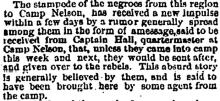STAMPEDE OF NEGROES.
DANVILLE, KY., April 22, 1865.
To the Editors of the Louisville Journal:
The stampede of negroes from this region to Camp Nelson, has received a new impulse within a few days by a rumor generally spread among them in the form of a message, said to be received from Captain Hall, quartermaster at Camp Nelson, that, unless they came into camp this week and next, they would be sent after, and given over to the rebels. This absurd story is generally believed by them, and is said to have been brought here by some agent from the camp.
Hundreds and thousands of negroes have been received into Camp Nelson from far and near for several months past, and maintained in idleness at the public expense to the great damage of the labor of the country for all the past year, and now the negroes, women and children, freed by the late act of Congress––wives and children of negro soldiers––are also flocking thither, and are received also and supported at the great expense of the Government, although their labor is badly wanted in the country, and the highest wages would be given for it.
An instance happened within my knowledge of a freed woman, receiving good wages from her late master, and well treated, who has gone to the camp within a few days. It is said that very many of the negroes, children especially, received there, have died from disease naturally engendered in such a place; and the collection of such a number of women, girls, and children must necessarily, under the circumstances, greatly demoralize them. My object is to bring this matter to the notice of General Palmer, and as a life-long friend to the negroes, and to their freedom and welfare and to the Government alike, to invoke his interposition––at least his examination into the state of the case. If one-half is true that is currently reported, and believed by most respectable men, warm and reliable friends of the Government, great abuses exist at Camp Nelson in this regard. It is certain that the country is receiving great injury in being deprived of its laborers, both slave and free, received at Camp Nelson, and fed by the officials there without law, greatly to their own permanent injury, to the injury of the Government, and of the surrounding country.
I have another object in view in bringing these facts to public attention. It is to urge upon the Legislature at its coming session to sanction the amendment at once of the Constitution of the United States, abolishing slavery, unless they wish to see the labor system of Kentucky wholly broken up. Slavery is twice dead, plucked up by the roots––why should they resist the amendment? To do so is greatly to injury our people. The sanction of the amendment by the Legislature of Kentucky would put an immediate stop to the state of things I have alluded to. The negroes would be satisfied that their freedom was safe, and the officials at Camp Nelson and elsewhere would cease the encouragement now given them to escape, which is now probably done to force the State into freedom. I wish the freedom of the negro in a legal manner, believing he ought to have it––that slavery is wrong in every way, and believing that it is the highest interest of Kentucky that slavery should cease.
P.S.––Upon what principle and under what law is it that the freed wives and children of negro soldiers, abundantly able to support themselves, and with good wages everywhere offered, are received and supported by Government at Camp Nelson, while there are the wives and children of thousands of white soldiers suffering in want and poverty all over the land, to whom no aid is given? The negro woman and children may be as good as the whites, but, surely, they are not better nor more deserving. I am willing the negroes should be free. I believe it would be better for us and for them. I am willing they should all have "the rights" they are qualified to enjoy, but I hardly think the wives and children of negro soldiers have more rights than those of white soldiers. The course pursued is giving unnecessary dissatisfaction to many of the best friends of the Government––men who have and who will still stick to it through thick and thin, through good report and through evil.
I hope and believe that the charges made against Capt. Hall are untrue; but there is "something rotten in Denmark," and it ought to be ventilated. I have it from the best authority––one who has been in command at Camp Nelson––that six or seven hundred negroes have died there within the last six months, and the state of morals among them is deplorable. How can it be otherwise, since hundreds of young girls, to say nothing of women of older age, have congregated there? OCCASIONAL.
"Stampede of Negroes," Louisville (KY) Daily Journal, April 28, 1865, p. 1

